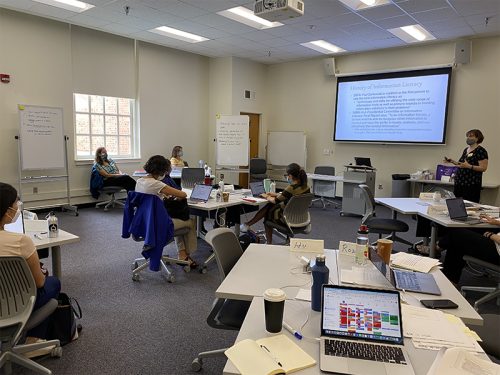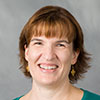This August, the Research and Instruction Services team hosted its first-ever ZSR Information Literacy Workshop for faculty. This three-day, immersive workshop was designed to expand students’ information literacy skills by working with faculty on further integrating information literacy skills into their course syllabi and assignments. We focused primarily on faculty teaching courses that meet basic or divisional requirements, as these courses are taken early in students’ academic careers when they need these skills the most.
We were pleased to welcome 11 faculty members from 10 different departments across all 5 divisions. We were also excited about hosting this event in-person (masked) at ZSR Library, and for several of us it was our first time back “in the classroom” since the pandemic began.

Early sessions featured the different ways to define and frame information literacy, including the ZSR Library Information Literacy Learning Outcomes and the ACRL Framework for Information Literacy in Higher Education. These presentations focused on bridging the gap between “skils-based” information literacy instruction and more conceptual approaches that acknowledge information as socially situated and contextual. In keeping with that theme, we also discussed newer models for teaching students source evaluation, including lateral reading and the SIFT method, which address the contextual nature of the sources we find online in ways that older models missed.
The faculty participants particularly enjoyed the sessions on teaching information literacy amidst the ongoing trends of mis- and dis-information and algorithm-based technologies. Roz and Hu’s session on “systems of information,” which highlights the cycle of creators, distributors, and consumers of misinformation was complimented frequently in the faculty feedback on the workshop. Overall, faculty feedback on the workshop was positive, with one faculty member commenting, “I wish everyone would attend this working… to understand just how multi-faceted academic literacies are, and how each of us, as disciplinary experts, needs to be at least somewhat responsible for teaching these concepts and practices.”
This workshop involved collaboration across the library and various campus offices. Several librarians pitched in the lead sessions and attended 1-to-1 meetings with faculty, including Joy, Elizabeth, Kathy, Kaeley, and Denice. Aramark came through big with coffee and a *seriously delicious* lunch buffet every day. Kristen in the ZSR Dean’s Office and Barbara M. in the Provost’s Office helped keep the money flowing where it needed to go. And finally, we couldn’t have done this workshop without generous support from the Provost’s Office Fund for Academic Innovation and the Z. Smith Reynolds Library Dean’s Innovation Grant.




3 Comments on ‘Integrating Information Literacy Skills in First Year Courses’
Thanks to all who participated in this great collaboration! Excellent work! It is so important to keep promoting methods to combat mis- and dis-information and promoting information literacy across the curriculum.
Glad to learn that this innovation and collaboration was a success!
Congratulations on what sounds like an amazing (plus well-caffeinated and tasty!) information literacy workshop, here’s to many more! Such important work.